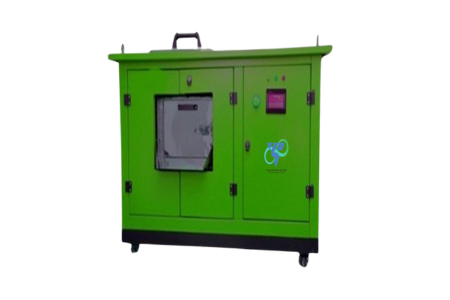Organic Waste Compost Machine:
An Organic Waste Compost Machine is an automated system that converts organic waste (like food waste, vegetable peels, garden waste, etc.) into nutrient-rich compost through a controlled biological process. It provides a sustainable and efficient way to manage waste while reducing environmental impact. Here’s a detailed breakdown of its working process and benefits:

Benefits of an Organic Waste Compost Machine
Environmental Benefits
- Reduces Landfill Waste: Diverts organic waste from landfills, reducing methane emissions and groundwater contamination.
- Lowers Carbon Footprint: Composting organic waste reduces greenhouse gas emissions compared to landfilling or incineration.
- Sustainable Waste Management: Encourages a circular economy by converting waste into a valuable resource.
Produces Nutrient-Rich Compost
- Improves Soil Health: The compost enhances soil fertility, structure, and water retention capacity.
- Natural Fertilizer: Reduces reliance on chemical fertilizers, promoting eco-friendly agriculture.
- Rich in Microorganisms: Compost provides beneficial microbes that improve plant growth and soil biodiversity.
Cost-Effective Solution
- Waste Disposal Savings: Reduces costs associated with waste transportation and landfill tipping fees.
- Compost Revenue: The compost produced can be sold or used in-house for gardening, landscaping, or farming.


Convenience and Efficiency
- Fast Process: Converts organic waste into compost in as little as 24 hours, compared to months in traditional composting.
- Compact Design: Machines are designed to fit into urban spaces, making them ideal for homes, apartments, hotels, restaurants, and offices.
- Low Maintenance: Requires minimal intervention, with automated operations and easy cleaning features.
Odor and Pest Control
- Odor-Free Operation: Equipped with odor-control systems like bio-filters, ensuring a clean and pleasant environment.
- Prevents Pest Infestation: Sealed operation eliminates the risk of pests attracted by organic waste.
Versatility
- Handles Various Waste Types: Suitable for processing kitchen waste, garden waste, and other biodegradable materials.
- Customizable Capacities: Available in various sizes, from small units for homes to large industrial models.
Promotes Green Practices
- Eco-Conscious Living: Encourages individuals and businesses to adopt sustainable waste management practices.
- Compliance with Regulations: Helps organizations comply with environmental waste disposal norms.
Long-Term Sustainability
- Energy Efficient: Modern machines are designed to consume minimal energy.
- Durable and Reliable: Built with long-lasting materials for extended use.
Working Process of an Organic Waste Compost Machine 🛠️
1.Waste Loading:
- Organic waste is loaded into the machine. It can include food scraps, vegetable peels, garden waste, or other biodegradable materials.
- Non-biodegradable items (like plastics, metals, and glass) must be separated before loading.
2.Shredding (Optional):
- Some machines include a shredding mechanism to reduce the size of waste materials. Smaller particles decompose faster and more uniformly.
3.Heating and Mixing:
- The machine provides controlled heating to maintain an optimal temperature (typically 50-70°C) to accelerate decomposition.
- An internal mixer ensures uniform aeration and mixing of waste, creating an ideal environment for microbial activity.
4.Microbial Decomposition:
- Special microbial cultures or enzymes (sometimes added to the waste) break down organic matter into simpler compounds.
- The process produces carbon dioxide, water vapor, and heat as by-products.
5.Moisture and Odor Control:
- Excess moisture is removed, and odor-control mechanisms ensure the process is clean and does not emit unpleasant smells.
- Some machines are equipped with bio-filters or activated carbon filters to neutralize odors.
6.Compost Formation:
- Within 24 hours to a few days (depending on the machine), the waste is transformed into compost.
- The final product is a dry, nutrient-rich compost ready for agricultural or gardening use.
7.Compost Collection:
- The compost is collected from the output chamber, and the machine is ready for the next cycle.
Applications of Organic Waste Compost Machines
- Residential Communities: Apartments, housing societies, and gated communities.
- Commercial Establishments: Restaurants, hotels, malls, and supermarkets.
- Industrial Settings: Food processing units, canteens, and factories.
- Municipalities: For city-level waste management and compost production.

